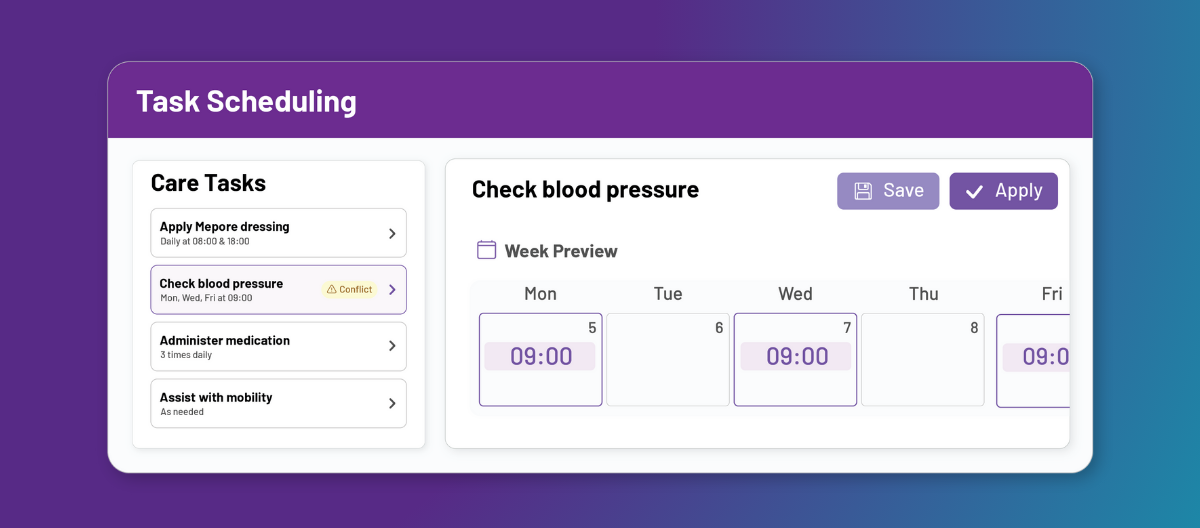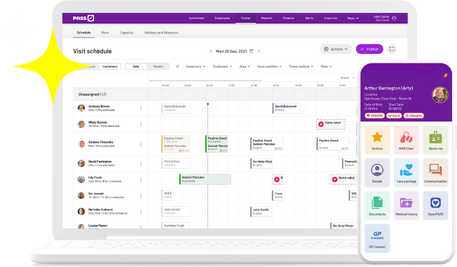Onboarding in health and social care is a key part of building a strong staff team.
Hiring new members of staff can be stressful and time-consuming – especially if you have to do it regularly. When you recruit new care workers, you need to make sure that they’re comprehensively trained, and familiar with your organisation’s policies and procedures.
Having a standard, comprehensive system of onboarding for carers can help to streamline this induction process, and ensure that your new starters feel welcome and confident.
Many providers use care management software to make this process easier.
In this guide, we’ll look at what onboarding is and why it’s important, discuss how to onboard new care staff, and share an example of a new employee onboarding checklist.

Table of Contents
What is onboarding and why is it important?
Onboarding is the process of introducing and welcoming a new staff member to your team.
Onboarding for carers usually includes introductions to clients, mandatory training, and shadowing current team members. Your organisation might have some other processes as well, such as visits to a head office, meeting directors, or taking part in events with other new starters.
Many care providers choose Care planning software that includes onboarding features, helping to ensure that everything from training schedules to compliance documentation is easily accessible for both managers and new starters.
A good onboarding system should:
- Help new starters meet their colleagues and feel comfortable with them
- Allow new employees to understand the organisation’s mission, and how they can help to achieve that
- Explain the organisation’s key policies and procedures
- Cover any legal requirements, such as mandatory training, checks, or registrations
- Address any skill gaps, and make sure that new starters understand what their role involves
These induction processes and activities are important for several reasons.
They help you as an organisation fulfil your legal obligations, ensuring all staff members are fully-trained and have the tools to competently carry out their role. Having a standardised onboarding system means that you know that all new starters have the same training, making it less likely for anyone to miss out.
Good onboarding systems can also give new starters confidence, explaining how they should do their job and telling them where they should go if they have questions or concerns. Even if they’re experienced care professionals, each organisation has different procedures and structures.
And good onboarding processes can even reduce staff turnover, helping to encourage your new starters to stay longer and become part of the community in your care home or domiciliary care agency.
Why is onboarding important for retention?
Good onboarding processes are one of the most important ways to improve staff retention in health and social care.
A comprehensive induction programme should introduce your new starters to all of the people and processes that can help them in their role. After completing their induction, they should be trained in all the activities they’ll do regularly, and feel confident about where to find support if there’s an issue.
Some of the most common reasons that people leave care work are burnout and poor communication within the organisation. Making sure that your new starters are well-trained and know where to go with problems can help reduce these issues.

How to onboard new care staff
When you’re planning onboarding in health and social care, you’ll need to think about a few different phases:
👉 Before your new employee starts
👉 The first day
👉 Training sessions
👉 Shadowing sessions
👉 Reviews
How to onboard new care staff: before they start
Onboarding in health and social care should begin before your new employee’s first day. This saves time when they start, and also helps to set out your expectations in advance.
Before they start, you may need to:
- Request documents that prove their right to work in the UK
- Give them information about uniforms or dress codes
- Set up logins for your organisation’s computer systems, as well as any home care software or online portals they’ll use
- Purchase or arrange any equipment they’ll use, such as a laptop, phone, swipe card or PPE
- Arrange DBS checks
- Ask for copies of their registration or licensing details, if they’re a nurse or work in another regulated profession
- Plan an induction schedule, and make sure that other team members have time to help
- Tell them about their shift pattern and give them a timetable for their first few days or weeks
You may need to give your new employee some information in an introductory email or a physical welcome pack. Remember to account for accessibility needs – do they need information in large print, for example?
Also, remember that your new starter doesn’t officially work for you until their first day – so you can’t require them to attend an induction day or training sessions unless you’re paying them.

How to onboard new care staff: the first day
When your new starter arrives, you or another team member will need to be ready to greet them. You might like to plan for them to arrive just before a handover or standup meeting, so that they can meet their colleagues in one go.
When they first start, you may need to:
- Let people know that they’re expected, especially reception or admin staff
- Make sure that you or another team member has time available to greet them and do introductions
- Introduce them to their new colleagues
- Do a tour of the building, or take them to visit the homes of domiciliary care clients
- Introduce them to the service users
- Arrange meetings with managers or directors
You may also be able to plan training or shadowing sessions for the first day.
Remember that it can be overwhelming to start a new role, especially if this is their first job, or if you work in a large care facility with lots of colleagues and clients. Ahead of their first day, you could ask if they prefer to meet new colleagues all at once, or if they would rather meet people in smaller groups or individually.
How to onboard new care staff: training
In most organisations, new support workers can’t start providing personal care until they’ve had some mandatory training – even if they’ve worked as a carer before. You may be able to start training on a new employee’s first day, or you might need to wait for a scheduled training session with external trainers.
Required training sessions should include:
- Health and safety awareness
- Fire safety
- Moving and handling
- Safeguarding
- Infection prevention and control
- First aid and basic life support
- Medication administration
- Food hygiene
- Equality and diversity
- GDPR and data protection
Depending on your organisation, you may also require training such as:
- Learning disability and autism awareness
- End of life care
- Supporting communication needs
- How to care for clients with dementia or other specific health needs
- Digital skills in the workplace
Some care providers also require their new starters to complete the Care Certificate, a framework that explains what a new care worker should understand.
When your new employee has completed the required training, you can start scheduling them in your roster.

How to onboard new care staff: shadowing
Onboarding in the care sector usually involves shadowing another carer. This helps the new employee learn more about the role, and also helps the client get to know their new carer.
How to plan and run good shadowing sessions:
- Ask the client’s permission. You should do this in advance, if possible, and again at the start of the care visit. Ask for consent again before any intimate care tasks, such as dressing, washing, or toileting.
- Ask the new employee to wear their uniform or identification, so that the client and their family understand why they are there.
- Before you arrive, talk to the new employee about their role during the shadowing session. Explain what they can and cannot do.
- Encourage the new employee to look at the client’s care plan ahead of the visit, so they know what to expect.
- Explain tasks as you go along.
- After the session, encourage the new starter to ask questions about the care visit, the care planning process, and personal care in general.
Remember that, while shadowing and onboarding are important for the new employee, your clients’ safety, comfort and dignity should always be the priority.
How to onboard new care staff: reviews
We know why onboarding is important, so it’s crucial to check in with your new employee to make sure they’re happy.
Depending on your schedule and their needs, you should plan regular review meetings over their first few weeks and months to gauge how they are finding their role. If they’re not yet confident with some tasks, they may need to redo some training or spend longer shadowing a more experienced care professional.
How long does onboarding take?
There’s no clear answer for how long onboarding in the care sector should take. It depends on your organisation and its induction procedures, as well as your new employee and their experience.
In most cases, the induction programme will take at least four to six weeks, but this can vary significantly.
For example, if your new starter has worked as a carer for ten years in similar organisations, they may need less training than someone who is new to being a support worker. Alternatively, if a care provider requires lots of sessions with external trainers before working independently, this may take time to organise.

New employee onboarding checklist
Your organisation may have its own new employee onboarding checklist, but if you don’t already have this kind of resource, here’s an example that you can use. We’ve divided it into two sections: before the new employee’s first day, and once they’ve started.
New employee onboarding checklist for care workers
Before they begin
- Request references
- Request details of the new starter’s right to work in the UK
- Request details of licensing or registrations, if necessary
- Complete DBS paperwork
- Share new starter information, including dress codes and codes of conduct
- Purchase any necessary equipment
- Set up logins for computer systems
- Arrange swipecards or copies of keys
- Arrange training sessions
- Plan shadowing sessions
- Arrange someone to greet the new starter on day one
Once they start
- Team introductions
- Service user introductions
- Building tour
- Give keys or swipecards, and other necessary equipment
- Share login details and explain computer systems
- Meetings with managers or directors
- Share training timetable
- Share shadowing timetable
- Review and catch up at the end of day one
- Review and catch up at the end of week one
- Review and catch up at the end of week two
- Review and catch up at the end of week three
- Review and catch up at the end of week four
Did you know? PASS has a useful employee checklist feature that can help you create checklists for new employee onboarding, training, performance management, and anything else that you need to keep in hand. Standardising your onboarding, training, and processes means that you’ll pick up on compliance issues quickly, and can continue to focus on supporting your clients.
Conclusion: Onboarding for carers
Starting a new job is always daunting, especially in the care sector. Each care provider has its own way of working, so it’s vital that new starters have a good induction programme.
Good onboarding for carers can help your new employees feel confident in their role. It also allows you as a care provider to fulfil your legal obligations, making sure that your staff team understand their role and are well-trained to deliver great care.





